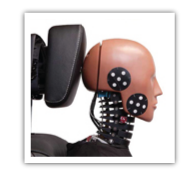
- Neuropsychological Assessment
- » Attention Deficit Hyperactivity Disorder
- » Learning Disability & Educational Assessment
- » Traumatic Brain Injury
- » Sports Injuries
- » Dementia & Age Associated Memory Impairment
- Therapy & Psychoeducation
- » Post Traumatic Stress
- » Depression
- » Anger
- » Grief & Loss
- » Anxiety
- » Chronic Pain
Traumatic Brain Injury
Traumatic Brain Injury (TBI) can produce a vast range of impairment, from undetectable to fatal. Brain injuries can produce complex changes to physical, emotional and cognitive abilities. Injury to the brain occurs when it is physically impacted or displaced by powerful acceleration/deceleration forces like those found in a car crash, IED explosion, sports injury or falls. Thread-like cells in the brain are highly vulnerable to tearing and shearing by these forces. The more cells are damaged or destroyed, the more obvious the brain injury becomes.
Cognitive impairments in personality, attention, memory, reasoning & judgment and self-awareness can become direct barriers to employment, quality of life and even functional independence.
Some Basic Facts:
» TBI is the most common cause of disability in children and young adults.
» In adults, the leading causes of brain injury are motor vehicle collisions, firearm injuries, and falls.
» It is not always necessary for the head to be physically hit in TBI, the violent displacement and concussion of the skull during “whiplash” also can cause neural damage in the brain.
» 75-90% of brain injuries are considered mild (mTBI) in nature. While less globally debilitating compared to moderate and severe injury, an estimated 5-15% of mTBI demonstrate persistent disability.
» Most mTBI do not show abnormalities on x-ray, CT, or MRI tests.
» 5.3 million Americans are living with long-term disabilities resulting from acquired brain injuries.
For more information and a listing of local resources and support groups, visit the Brain Injury Association of Washington at http://www.braininjurywa.org/ or call Washington Traumatic Brain Injury Resource Center at 877-824-1766.
-

- Dr. David Knopes, Ph.D.
- » Contact & Appointments
- » Education & Experience
- » Memberships, Licensure & Professional Ethics
- Resources
- » Fees & Insurance
- » Forms
- » Confidentiality
- » Emergencies
![]()
© 2014 Sound
Psychology, Dr. David Knopes, Ph.D. All Rights Reserved. Website Design
by TenTen Design Studio.